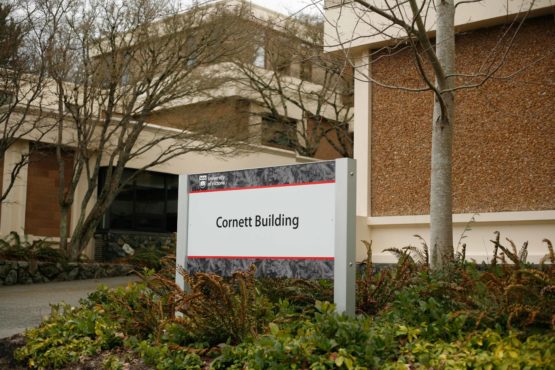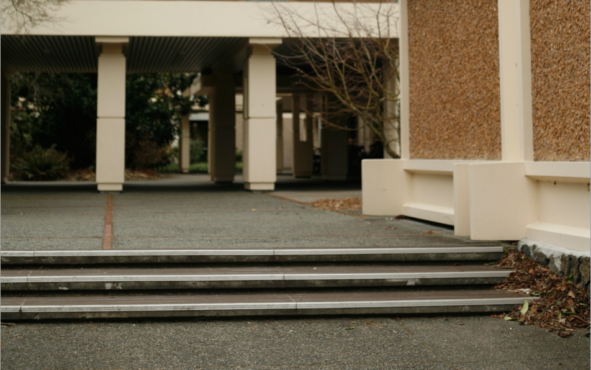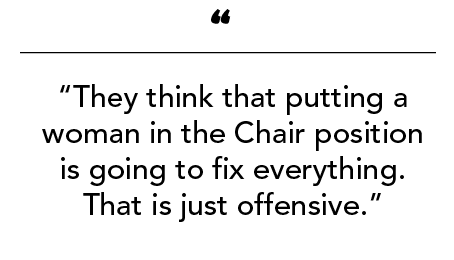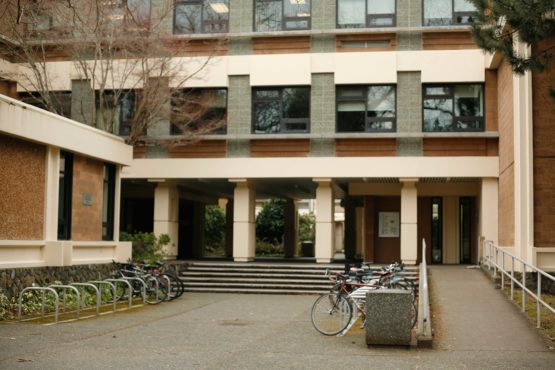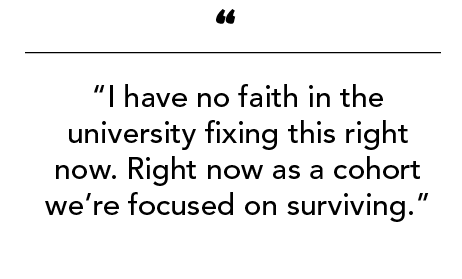UVic’s Sociology department split over grad representative elections, program reviews, and allegations of sexism and racism
The twisting corridors of Cornett have hidden more than their share of secrets since they were built in 1967. But the walls and stairwells of the notoriously complicated building have housed a particularly ominous conflict this year — a department in the middle of a cold war.
In the building’s A Wing, on its third floor, the University of Victoria’s Sociology department has been slowly splitting over the course of the year, with professors and students alike taking sides. The tension has grown and reached Equity and Human Rights (EQHR), the Faculty of Graduate Students, and even UVic’s Provost. As a committee running the search for a new Chair of the department re-issues a call for nominations after an unsuccessful first attempt, and program reviews are planned for the near future, the divide shows few signs of healing.
Several Sociology students have spent their last seven months frustrated by a department they say alienates and bullies them. They point to a lack of diversity in faculty and curriculum, an unwillingness to engage with Indigenous and feminist scholarship, a lack of transparency and openness in departmental governance and funding, and experiences of racism, sexism, and ageism both within classrooms and outside of them.
On the other side, however, professors worry that students feel shamed into being part of an “us vs. them narrative,” and some students say a small group of their peers are embellishing grievances and misrepresenting the sentiment of other graduate students.
On April 24, students from the Sociology department will gather for a town hall, ready to delve into these issues that are boiling up beneath the Cornett floors. Some students will not be there, perhaps to avoid another dose of tension. Students who do attend, however, will most likely reiterate concerns they have been voicing for months.
The concerns make for a tense environment for all. Faculty members speak of exclusive clubs of professors that leave outsiders marginalized. Graduate students avoid the Sociology offices, which are emptier for (predominantly female) professors either retiring or relocating to other UVic departments. Some grads face complicated and intensive EQHR processes on top of precarious living and health situations.
Even the current Chair of the department, Dr. Sean Hier, lamented the harm done to the faculty in an email to the Martlet, calling the way the complaints have been handled “unfair.”
The roots of the problem can be traced back 25 years, and yet it appears as though relationships in the department have never been worse than they are today.
“Students are upset. They’ve had it.”
“Students are upset. They’ve had it,” says Renay Maurice, a second-year Master’s student at UVic, the elected student representative for Master’s students in the Sociology department, and a member of the GSS graduate representative council. “We’re sociologists, after all, so to not be grappling with gender, race, and Indigeneity in any real way is really not cool at this stage.”
Sonia Hill is a Kanien’keha:ka (Mohawk) student, and Master’s student in her first year at UVic. Throughout her undergraduate degree, Hill says she worked in a department that offered her comfort and support. Here at UVic, where she says she was asked to help teach courses that allow students to argue whether colonization is positive or negative, she says things are different.
“I have discouraged Indigenous students that I know from coming here,” Hill says. “Coming from outside of an Indigenous-focused program, I’m really struggling, and I don’t see the supports, at least within my department, for community here.”
Both Elaine Laberge, a PhD student who comes from generational poverty, and Jessica Annan, an MA student from Calgary, speak to experiences of professors attempting to decide on their research focuses for them, moving them away from the work that they have been doing with marginalized communities in their academic careers.
Laberge says that professors in the department criticize other faculty members and students regularly; that communication, fairness, and transparency is lacking regarding department funding; that she has faced pressure to quit her TA positions; and that the general sexist, elitist, and ageist atmosphere has caused such a severe anxiety that she has visited several health care specialists and hospital rooms.
Several Sociology students interviewed spoke to avoiding the department, retreating within themselves to complete their research in isolation.
“It’s not understood how pre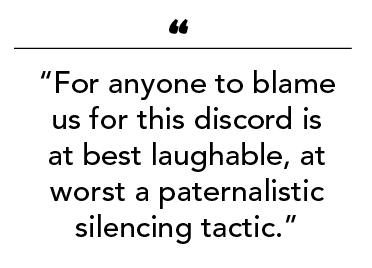 carious life as a grad student really is,” says Susan Kim, the former chair of the GSS.
carious life as a grad student really is,” says Susan Kim, the former chair of the GSS.
Grads are expected to be researchers, she says, overseen by supervisors who can be too busy with their own teaching and research to be fully connected to a Master’s project. Grad students must also scrap for funding, which Kim explains is scarce at UVic compared to other universities. Also, they must submit assignments and grant applications, alongside their duties as teaching assistants in undergraduate classes and seminars.
“It really sandwiches and creates a club sandwich of doom,” Kim laughs.
It’s a striking image, to say the least, but it rings true (and can be a lot to swallow for some students). The delicate balance of work, life, and studying can often be overloaded by the smallest of pressures — though issues of institutional marginalization and bullying are anything but.
“I’ve heard of what comes off as personal issues,” says Kim, discussing when she was first made aware of the problems. “I understand now [that these] are systemic.”
Lunch and Learn
The most recent and public airing of these concerns took place on March 13, at a Lunch and Learn town hall and luncheon organized by Mike Lang, the department’s PhD representative; members from CUPE 4163, UVic’s educational employees’ union; and Maurice, Laberge, and other students.
Attended by an Old One from the First Peoples’ House, representatives from EQHR, the Graduate Student Society, and the Faculty of Graduate Studies, and graduate and undergraduate students, the event was designed to provide a space of solidarity for students and also begin to hold senior faculty officials accountable — officials such as Dr. Catherine Krull, the Dean of Social Sciences.
Krull was in the hot seat for much of the Lunch and Learn, answering questions from a crowd of 30 to 40 students for over an hour on departmental governance, support for marginalized students, and the upcoming search for a new Chair.
“She handled the questions quite well initially,” says Eden Wallis, the President of BOSS (Bureau of Sociology Students, the department’s undergraduate course union), who attended as an undergraduate representative. “But we started asking some really tough questions.”
One point of conflict was Krull’s assurance to the group that the department was hiring two new female faculty members (one of whom has already been hired and starts in July). Maurice says that Krull told the group the new Chair would also be female.
The new hires would go some way towards offsetting the lack of female faculty members (Dr. Douglas Baer, a professor in the department, estimates that bar the recent preferential hire starting in July, the last eight or nine full-time permanent hires in the department have been male, and the last three professors to leave were female), but the students present were not entirely convinced.
Maurice doubts that any Chair nominee from within the department would be able to affect the problems inherent there now. Laberge agrees, and doesn’t mince her words in doing so.
“They think that putting a woman in the Chair position is going to fix everything. That is just offensive,” Laberge says. “Bring a chick in and . . . and what?”
Hill also spoke at the Lunch and Learn, discussing her experience as an Indigenous student, and her professor’s rebukes when she tried to bring decolonized research to the department.
“She seemed like she heard me and understood what I was saying, and really was trying to feel what I was saying,” Hill says, “but then the conversation became again, that we’re expected to now do this work to change everything. How do you expect that to happen when we’re just trying to manage ourselves and get through the program?”
The Lunch and Learn continued after Krull had to leave, and those who were there spoke positively about the solidarity present in the room.
Not every Sociology student attended, however. Thomas Mallette, for instance, had class when the luncheon began and didn’t want to arrive late.
Besides, he quips, “I didn’t feel like making enemies that day.”
Across the Aisle
Mallette is one of several students who disagrees with both the original complaints and the methods used to communicate those complaints. Reiterating accounts from professors who spoke to the Martlet, Mallette discussed students being shamed and bullied into going along with the concerns and speaking to EQHR.
But he agrees with Maurice, Laberge, and others on one point — the environment of the department.
“There are political divides right now that make even just coming to school very difficult,” Mallette says. “Even from the beginning of the semester, there was a huge apprehension for people to speak their minds, inside of the classroom setting. Not a result of the professors, but a result of students.”
Mallette says these students demonized people based on the colour of their skin — refusing what he calls valid aspects of syllabuses simply because their author happened to be white or a male. 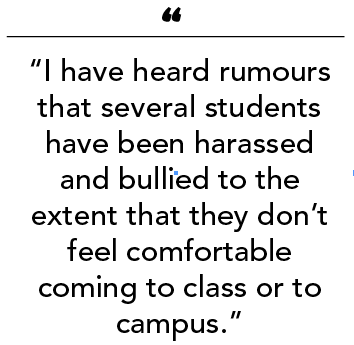
Mallette and other students — speaking on condition of anonymity — reference a letter sent from students in the Sociology department to EQHR, detailing the concerns of diversity and atmosphere that were raised at the Lunch and Learn. In sending the letter, however, Mallette and others believe they were spoken of on someone else’s behalf, lumped in with allegations (some of which Mallette calls “unfounded”) against the department.
He recounts experiences of students walking into the department, being handed the letter, and asked to sign. Mallette is concerned with the pressure that comes with that request — the pressure of taking a side and potentially sacrificing professional relationships.
“If you don’t sign this letter, what does it do?” he asks.
Even faculty members sense the divide. Professor Peyman Vahabzadeh says he has heard similar concerns from students.
“They feel they are approached rather intrusively to support the above narrative and are being ‘shamed’ into being a part of it,” Vahabzadeh wrote in an email. “I am told that there is an issue of representation here, and the view of certain graduate students within the department does not reflect their own.”
Dr. Sean Hier, the current Chair of the department, recounts similar rumours.
“From what I understand—and let me be clear that I have no personal experience with this— the graduate students making the claims [about the department’s lack of diversity and student representation] have created a difficult climate for staff, faculty, and particularly other students,” Hier said via email. “I have heard rumours that several students have been harassed and bullied to the extent that they don’t feel comfortable coming to class or to campus.”
Maurice says that for a professor of Sociology to suggest that she and other representatives have acted with anything but the utmost integrity is “troubling and untrue.”
“What the professor says obfuscates what is actually happening, and casts aspersions and blame on sociology student representatives and a few student leaders who are attempting to address more than two decades of departmental drama, divisiveness, and toxicity,” Maurice writes. “For anyone to blame us for this discord is at best laughable, at worst a paternalistic silencing tactic.”
“What we are attempting to do is precisely to address this othering, silencing, and abusive culture, and mend it,” Maurice continues. “We have nothing whatsoever to gain from increasing the already miserable climate in the department, and everything to gain from attempting to heal.”
Tensions have also arisen as part of elections for graduate student representatives in the Sociology department, which has four positions for nominees — one main and one alternate MA student representative, and one main and one alternate PhD representative.
Nominations for the positions opened in March 2017, but only two students were nominated for the positions of main Masters and PhD representatives. The process was extended by the department’s Graduate Secretary to allow more nominations for both main and alternate representatives. Three students — Mallette and two others — were nominated after the extension.
The reason for the extension? It depends on who you ask.
A student who wished to remain anonymous says that this extension broke protocol — that the two original nominees should have been acclimated — alleging that the department extended the deadline because they didn’t like that the original candidates were female, feminist, and committed to tackling issues of diversity in the curriculum and faculty.
Another student from the department who asked to remain anonymous thinks the deadline was most likely extended to increase the diversity of options up for the position. This student says the original nominees and the new nominees split along the same ideological lines that separate much of the department.
The original nominees, the student says, had problematic methods and tactics when it came to addressing diversity and student representation in the department, and they complained after seeing how much support the new nominees were getting.
“They started to get worried that we would win,” the student says, half-joking.
Whatever the reason, the department eventually reverted to the original deadline, and the three extended candidates were disqualified. Only a few days afterward, however, the two original candidates resigned, meaning the grad representative election will restart in September.
The instability continues.
Past and Future
The town hall on April 24 will provide an opportunity for Sociology students to work together on healing the divides (something that has started—graduate representatives met with the Chair on Tuesday, April 17). They have their work cut out, considering these kinds of concerns have existed on the UVic campus for decades.
In the 1990s, female professor Dr. Somer Brodribb and five female students in the Political Science department at UVic organized a committee they dubbed the “Chilly Climate Committee,” dedicating themselves to fixing what they saw as an anti-woman and anti-feminist sentiment in the department. The committee’s subsequent report detailed these sentiments, and also accused male professors of harassment.
UVic instituted a harassment policy after the report was released, but four male professors in the department also filed a lawsuit against the CBC for airing interviews with members of the committee who had allegations of discrimination. After an independent examination from the university, things calmed down in the department.
But 25 years later, the Sociology department is the latest department to feel the strain of this split. What one group sees as efforts to encourage students to speak to EQHR are seen by some as tactics that increase the risk of departmental ostracization. What some consider unfounded and embellished grievances are difficult and traumatic experiences for others.
In an email, Krull confirmed there would be an academic program review (overseen by external committees of academic faculty members from both within UVic and from among other universities), but did not confirm reports from other students that there would be a specific review focussed at department conduct, rather than curriculum.
For some, the distinction is moot, and the reviews are meaningless.
“I think it’s honestly damage control at this point,” first year MA Hill says. “I have no faith in the university fixing this right now. Right now as a cohort we’re focused on surviving.”
Survival means a different thing for each member of the Sociology department, it seems. Some hold no hope in any of its mechanisms, and dream of leaving the department as soon as they can. Others acknowledge the problems but say people are committed to fixing them, asserting that there are plenty of Sociology students who have had great experiences in the program.
There is no short-term solution in sight. The department recently started a new nomination period for a new department Chair, citing an unsuccessful first call. Faculty and students continue to meet, hoping to find a resolution to appease each party.
Whether a resolution is found or not, the voices, from all sides, are getting louder. They have begun to permeate an institutional silence that sits over many departments at UVic, but particularly this one.
“Something I’ve heard echoed a lot from the students on this issue is ‘we thought we were the only ones,’” says Kim, former GSS Chair.
That doesn’t encourage her.
“If nobody is talking about it,” Kim says, “that’s not a good thing.”



